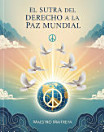The Spiritual Rights Sutra
About this ebook
Structured in four sections —Preamble, Foundation, Fundamental Responsibilities, and Essential Rights— the Sutra unfolds a vision in which freedom, equality, fraternity, and charity are recognized as expressions of the intrinsic spiritual dignity of all beings. At its core lies a Decalogue of Spiritual Rights, inspired by Gautama’s Noble Eightfold Path and expanded into ten guiding principles, ranging from Right Understanding to Right Liberation.
The text denounces the failure of States and institutions to safeguard fundamental freedom and the care of the Earth, proposing instead a new global ethical order rooted in compassionate wisdom (prajñā-karuṇā). At the same time, it calls for reconciliation among peoples, mutual respect, ethical action, and spiritual awakening as essential conditions for the survival and evolution of humanity.
The Sutra of Spiritual Rights is not only a legal document but also a spiritual manifesto and an urgent call to build a civilization reconciled with nature, with one another, and with itself. It is a work intended for jurists, philosophers, spiritual practitioners, and every conscience committed to justice, peace, and the future of humanity.
Ratings and reviews
About the author
Master Maitreya is professor in Buddhist Law, and also he is the creator of Buddhist Abolitionism of Maitriyana tradition.
Also, he is graduated as Justice of the Peace, having specializations in Human Rights, Constitutional Law, Indigenous Peoples, Environmental Law, Extrajudicial Conciliation, Arbitrage, Criminal Intelligence, International Penal Law, and Genocide Studies.











